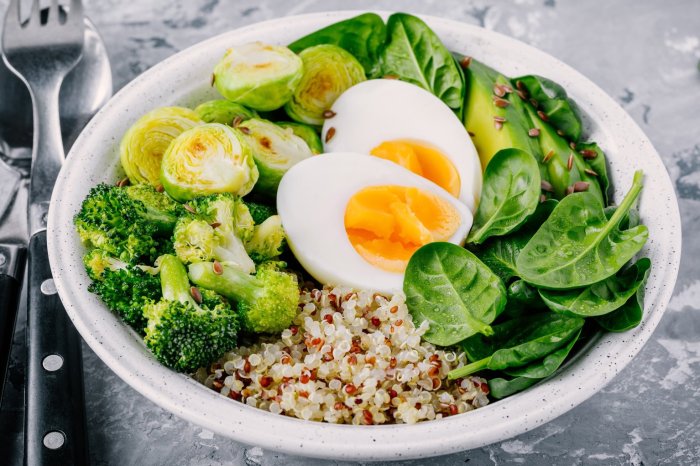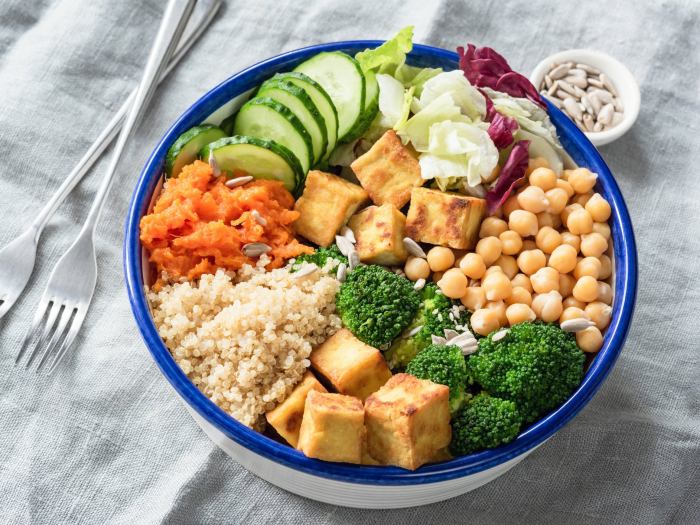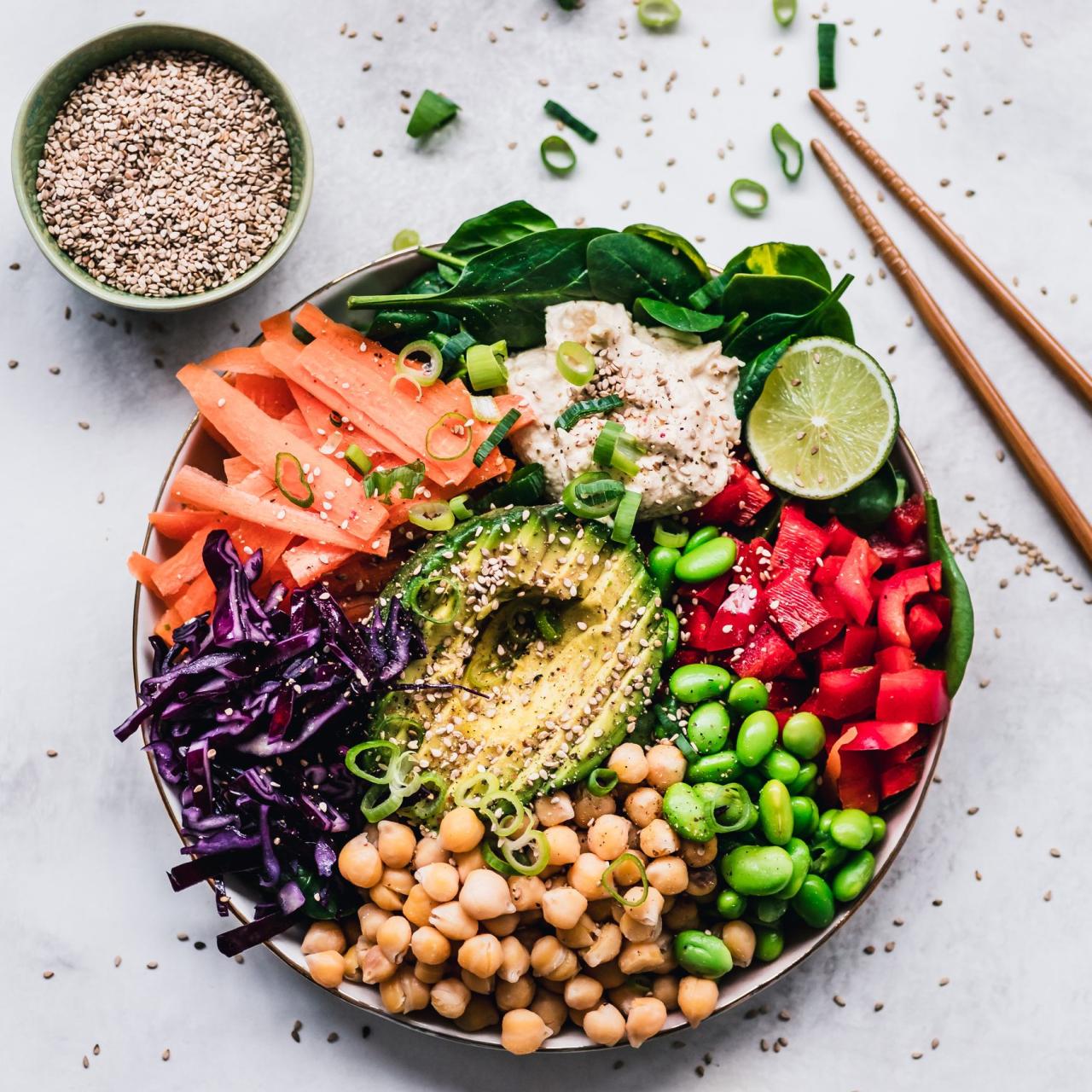How to eat a vegetarian diet – Embark on a culinary adventure with our comprehensive guide to a vegetarian diet. Whether you’re a seasoned herbivore or curious about plant-based living, this guide will equip you with the knowledge and inspiration to thrive on a vegetarian path.
From understanding the basics of vegetarianism to navigating the intricacies of meal planning, we’ll delve into the essential nutrients for vegetarians and explore a vast array of plant-based food sources. Along the way, we’ll share practical tips, delicious recipes, and expert insights to empower you on your vegetarian journey.
Introduction to a Vegetarian Diet
Vegetarianism is a type of diet that excludes meat, poultry, fish, and seafood. There are various types of vegetarian diets, including:
- Lacto-ovo vegetarian:Consumes dairy and eggs.
- Lacto-vegetarian:Consumes dairy but not eggs.
- Ovo-vegetarian:Consumes eggs but not dairy.
- Vegan:Excludes all animal products, including dairy, eggs, and honey.
Adopting a vegetarian diet may offer potential health benefits, such as:
- Lower risk of heart disease, stroke, and type 2 diabetes.
- Improved blood pressure control.
- Reduced risk of certain types of cancer.
- Improved digestion and regularity.
Planning a Vegetarian Diet

Meal planning is crucial for vegetarians to ensure they consume a balanced and nutritious diet. It involves organizing meals to meet specific nutritional requirements while adhering to the vegetarian lifestyle.
Creating balanced vegetarian meals requires considering the following:
- Variety:Including diverse food groups such as fruits, vegetables, whole grains, legumes, nuts, and seeds ensures a wide range of nutrients.
- Complementary Proteins:Combining plant-based proteins, such as beans and rice or lentils and quinoa, provides a complete amino acid profile.
- Adequate Calories:Vegetarians may need to consume more calories than non-vegetarians due to the lower calorie density of plant-based foods.
- Iron Intake:Iron is less bioavailable in plant foods; therefore, vegetarians should focus on consuming iron-rich foods like spinach, lentils, and fortified cereals.
- Vitamin B12:Vitamin B12 is primarily found in animal products, so vegetarians need to obtain it from fortified foods or supplements.
Protein Sources in a Vegetarian Diet
Protein is essential for building and repairing tissues. Vegetarians can obtain protein from various plant sources, including:
- Legumes:Beans, lentils, and peas are excellent sources of protein and fiber.
- Soy Products:Tofu, tempeh, and edamame are complete proteins containing all essential amino acids.
- Nuts and Seeds:Almonds, walnuts, and chia seeds provide protein and healthy fats.
- Whole Grains:Quinoa, brown rice, and oats contain moderate amounts of protein and fiber.
- Dairy and Eggs:For lacto-ovo vegetarians, dairy products and eggs are good sources of protein and other nutrients.
Essential Nutrients for Vegetarians

Vegetarian diets provide numerous health benefits, but they require careful planning to ensure adequate intake of essential nutrients. Vegetarians should pay particular attention to obtaining sufficient protein, iron, calcium, vitamin B12, and omega-3 fatty acids.
Here’s how to obtain these nutrients from plant-based sources:
Protein
- Legumes (beans, lentils, chickpeas, peas)
- Tofu, tempeh, edamame
- Nuts, seeds, and nut butters
- Whole grains (brown rice, quinoa, oats)
Iron
- Leafy green vegetables (spinach, kale, collard greens)
- Legumes
- Fortified cereals
- Iron supplements may be necessary for some vegetarians
Calcium
- Leafy green vegetables
- Fortified plant-based milk and yogurt
- Tofu, tempeh
- Calcium supplements may be necessary for some vegetarians
Vitamin B12
- Fortified plant-based milk and yogurt
- Nutritional yeast
- Vitamin B12 supplements are recommended for all vegetarians
Omega-3 Fatty Acids, How to eat a vegetarian diet
- Flaxseeds, chia seeds, and walnuts
- Algae supplements
- Omega-3 fatty acid supplements may be necessary for some vegetarians
It’s important for vegetarians to monitor their intake of these essential nutrients and consider supplementation if necessary. Regular blood tests can help ensure adequate levels and identify any potential deficiencies.
Food Sources for Vegetarians
A vegetarian diet offers a diverse range of plant-based foods that provide essential nutrients. These foods can be categorized based on their nutrient content, ensuring a balanced intake.
Vegetarian diets emphasize the consumption of fruits, vegetables, whole grains, legumes, nuts, and seeds. These foods are rich in fiber, vitamins, minerals, and antioxidants, which are crucial for overall health and well-being.
Protein Sources
- Legumes (beans, lentils, chickpeas): Rich in protein, fiber, and iron.
- Soy products (tofu, tempeh, edamame): Excellent sources of protein, calcium, and iron.
- Nuts and seeds (almonds, walnuts, chia seeds): Provide protein, healthy fats, and essential minerals.
- Whole grains (brown rice, quinoa, oats): Contain protein, fiber, and essential vitamins.
Example recipe: Lentil and sweet potato curry with brown rice
Iron Sources
- Leafy green vegetables (spinach, kale, collard greens): Rich in iron, vitamin C, and antioxidants.
- Legumes (beans, lentils, chickpeas): Good sources of iron, protein, and fiber.
- Fortified cereals and grains: Enhanced with iron to meet daily requirements.
- Dried fruits (raisins, apricots, dates): Contain iron, fiber, and antioxidants.
Example recipe: Spinach and tofu stir-fry with fortified quinoa
Calcium Sources
- Dairy alternatives (fortified plant-based milk, yogurt, cheese): Provide calcium, vitamin D, and protein.
- Leafy green vegetables (collard greens, kale, bok choy): Rich in calcium, vitamin K, and antioxidants.
- Soy products (tofu, tempeh): Contain calcium, protein, and isoflavones.
- Nuts and seeds (almonds, sesame seeds): Good sources of calcium, healthy fats, and essential minerals.
Example recipe: Calcium-fortified almond milk smoothie with spinach and berries
Tips for Eating a Vegetarian Diet
Embracing a vegetarian diet can be a transformative journey, but it requires thoughtful planning and mindful choices. Here are some practical tips to guide you along the way:
Transitioning to a Vegetarian Diet
- Start gradually: Begin by incorporating meatless meals into your routine a few times a week. Gradually increase the frequency as you become more comfortable.
- Experiment with different cuisines: Vegetarian dishes from various cultures offer a wide range of flavors and textures, making the transition more enjoyable.
- Seek support: Join online forums, connect with other vegetarians, or consult with a registered dietitian for guidance and encouragement.
Addressing Common Challenges
- Protein intake: Include protein-rich plant foods such as beans, lentils, tofu, tempeh, and quinoa in your meals.
- Vitamin B12 deficiency: Fortified foods, such as plant-based milk and cereals, or supplements may be necessary to ensure adequate intake.
- Iron absorption: Consume iron-rich foods like spinach, beans, and lentils with vitamin C sources, such as citrus fruits, to enhance absorption.
Importance of Variety and Moderation
A vegetarian diet should be diverse and well-balanced. Include fruits, vegetables, whole grains, legumes, nuts, and seeds in your meals. Avoid excessive consumption of processed foods, sugary drinks, or unhealthy fats to maintain optimal health.
Meal Ideas for Vegetarians: How To Eat A Vegetarian Diet
Meal planning is crucial for a healthy vegetarian diet. Here’s a sample vegetarian meal plan for different days of the week, providing a variety of nutritious options.
Breakfast
* Monday: Oatmeal with berries and nuts (250 calories)
Tuesday
Tofu scramble with vegetables (300 calories)
Wednesday
Whole-wheat toast with avocado and hummus (275 calories)
Thursday
Embracing a vegetarian lifestyle can be a transformative choice, offering a myriad of health benefits. Studies have shown that vegetarian diets are associated with a lower risk of chronic diseases such as heart disease, stroke, and type 2 diabetes. By incorporating a diverse range of plant-based foods, vegetarians can reap the rewards of a balanced diet rich in fruits, vegetables, whole grains, and legumes.
Discover more about the health implications of a vegetarian diet and make an informed decision that aligns with your well-being goals.
Smoothie made with fruits, vegetables, and plant-based milk (325 calories)
A vegetarian diet, which excludes meat and fish, has been gaining popularity due to its potential health benefits. Research suggests that a vegetarian diet can lower the risk of certain chronic diseases, such as heart disease and type 2 diabetes.
Vegetarian diets are typically rich in fruits, vegetables, and whole grains, which provide essential nutrients and antioxidants that can support overall health.
Friday
Yogurt with granola and fruit (350 calories)
Lunch
* Monday: Lentil soup with whole-wheat bread (350 calories)
Tuesday
Salad with grilled tofu, quinoa, and vegetables (400 calories)
Wednesday
Vegetarian chili with cornbread (450 calories)
Thursday
Bean burrito with brown rice and salsa (425 calories)
Friday
Hummus and vegetable sandwich on whole-wheat bread (375 calories)
Dinner
* Monday: Vegetarian lasagna with whole-wheat pasta (500 calories)
Tuesday
Stir-fried vegetables with brown rice (450 calories)
Wednesday
Black bean tacos with corn tortillas (475 calories)
Thursday
Shepherd’s pie with lentils and mashed potatoes (525 calories)
Friday
Pizza with whole-wheat crust and vegetable toppings (550 calories)
Snacks
* Fruit (100-150 calories)
- Vegetables with hummus (150-200 calories)
- Yogurt (150-200 calories)
- Trail mix (200-250 calories)
- Whole-wheat crackers with peanut butter (250-300 calories)
Vegetarian Cooking Techniques
Vegetarian cooking involves preparing and cooking dishes without using meat, poultry, fish, or seafood. It emphasizes plant-based ingredients such as fruits, vegetables, legumes, grains, and nuts. Mastering basic vegetarian cooking techniques allows for the creation of delicious and nutritious meals.
Preparing Vegetarian Dishes
Preparing vegetarian dishes involves selecting fresh, high-quality ingredients and using appropriate cooking methods. Vegetables should be washed thoroughly and cut into uniform pieces for even cooking. Legumes, such as beans and lentils, may require soaking or boiling before use. Grains, like rice and quinoa, should be rinsed and cooked according to package instructions.
Cooking Vegetarian Dishes
Vegetarian dishes can be cooked using various methods, including sautéing, roasting, baking, grilling, and steaming. Sautéing involves cooking ingredients in a pan with a small amount of oil or fat. Roasting is a dry-heat cooking method where vegetables or tofu are cooked in an oven.
Baking is similar to roasting but involves using a covered dish. Grilling is a method where food is cooked over direct heat, often on a grill or barbecue. Steaming is a gentle cooking method that preserves the nutrients and flavors of vegetables.
Spices, Herbs, and Seasonings
Spices, herbs, and seasonings play a crucial role in enhancing the flavors of vegetarian dishes. Spices, such as cumin, coriander, and turmeric, add warmth and depth to dishes. Herbs, like basil, oregano, and thyme, provide freshness and aromatic notes. Seasonings, such as salt and pepper, balance the flavors and enhance the overall taste.
Experimenting with different combinations of spices, herbs, and seasonings allows for the creation of unique and flavorful vegetarian meals.
Last Recap

Adopting a vegetarian diet is not merely a dietary choice; it’s an opportunity to embrace a healthier, more sustainable, and compassionate lifestyle. With careful planning and a willingness to explore new flavors, you’ll discover the joy and fulfillment that comes with nourishing your body and the planet through plant-based nutrition.
Questions and Answers
Is a vegetarian diet healthy?
Yes, a well-planned vegetarian diet can provide all the essential nutrients your body needs. It’s rich in fruits, vegetables, whole grains, and legumes, which are excellent sources of vitamins, minerals, fiber, and antioxidants.
What are the benefits of a vegetarian diet?
A vegetarian diet has been linked to numerous health benefits, including reduced risk of heart disease, stroke, type 2 diabetes, and certain types of cancer. It can also improve digestion, boost energy levels, and promote weight management.
How do I get enough protein on a vegetarian diet?
There are many excellent plant-based sources of protein, including beans, lentils, tofu, tempeh, nuts, and seeds. By combining different plant-based proteins throughout the day, you can ensure you’re getting all the essential amino acids your body needs.